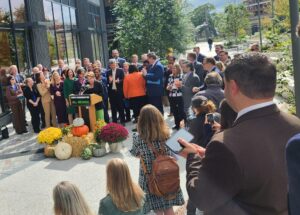
Gov. Maura Healey, Lt. Gov. Kim Driscoll and Attorney General Andrea Campbell touted compliance with the MBTA Communities law on Oct. 1, 2024 ahead of a high-stakes court battle over the law between the state and the town of Milton. Photo by Gintautas Dumcius | CommonWealth Beacon
Days before attorneys representing Massachusetts state government and the town of Milton face off in a dispute over the MBTA Communities law, Gov. Maura Healey and Attorney General Andrea Campbell sought to spotlight the cities and towns that are taking the opposite tack.
The Supreme Judicial Court will hear arguments Monday on whether Campbell has the legal authority to force Milton to comply with the law, which requires 177 communities to approve zoning for multifamily housing. The law passed as part of an economic development package in 2021 as the state grapples with a housing crisis where demand vastly outstrips supply.
Milton officials argue that Campbell does not have the authority to enforce it, and they’ve continued to claim that the town has been misclassified as a rapid transit community. The trolley line that runs through the town, they’ve said, is not rapid transit because it’s not a subway.
“We don’t think it’s a winning argument. And I’m going to leave it to the attorney general who will be representing the Commonwealth in court next week on that,” Healey told reporters after her event with Campbell. “We’ve been very clear that the MBTA Communities Act is constitutional. It’s something we think the SJC should uphold.”
The event was held in Somerville, outside a 450-unit mixed-income building steps from the Union Square terminus of the Green Line. Somerville councilors voted in 2023 to allow three-decker homes to be built citywide without need for special permits, also known as “as of right.” Other communities, such as Newton, focused on approving multi-family zoning in certain districts and areas in order to come into compliance with the MBTA Communities law.
Healey and Campbell were joined by officials from Quincy, Cambridge, and Everett, among other cities and towns. The event came after the town of Southborough, a Worcester County community that has a stop on the Framingham/Worcester commuter rail line, narrowly voted to approve its multifamily zoning plan, making it a total of 75 communities “acting in good faith to follow the law,” according to Campbell.
‘We’re Winning’ and ‘We’re Not Going to Stop Here’
Campbell said that while next week her office’s attorneys will be “in court to enforce this critical law,” the Somerville event was to cheer the law and “the recognition of the incredible momentum behind the incredible MBTA Communities law.”
“We are winning this fight for housing,” added Lt. Gov. Kim Driscoll, who served as mayor of Salem before winning statewide office.
“We’re not going to stop here,” she said.
The state is facing an estimated shortage of 200,000 housing units by 2030, a figure cited by Somerville Mayor Katjana Ballantyne.
The total minimum unit capacity for the 177 communities that fall under the MBTA law is 297,190 units. But that figure covers units that the communities are zoning for, not necessarily the number of units that would get built.
Healey’s Executive Office of Housing and Livable Communities, led by former Worcester city manager Ed Augustus, has signed off on nearly three dozen communities’ plans, meaning they’re eligible to apply for a “catalyst fund” meant to help housing and infrastructure projects.
The list of communities includes Arlington, Abington, Andover, Braintree, Brookline, Cambridge, Chelsea, Dedham, Easton, Grafton, Harvard, Hull, Lexington, Lincoln, Lowell, Medfield, Medford, Northbridge, Quincy, Randolph, Revere, Rockland, Salem, Sharon, Somerville, Stoneham, Swampscott, Taunton, Tyngsborough, Walpole, Wayland, Westford and Worcester.
Augustus also cited public support for the MBTA Communities law in a recent poll for CommonWealth Beacon and WBUR. The survey of likely Massachusetts voters, conducted by MassINC Polling Group asked whether they believed the law was a good policy or a bad policy. Fifty percent said called it “good,” while 31 percent said it was “bad,” and 19 percent didn’t know or refused to answer.
“We are chipping away at the housing crisis,” Augustus told the crowd.
This article first appeared on CommonWealth Beacon and is republished here under a Creative Commons license.![]()






